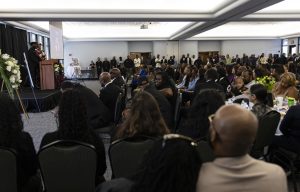eLove: Search for the perfect match
June 1, 2009
Approxiamtely 210 billion e-mails are sent out each day worldwide. Assume that all 6.7 billion people on Earth receive e-mail, and this averages out to 31 e-mails per person each day. For those people who participate in online dating, one of those 31 e-mails contains the match with the potential love of thier life.
No, this is not the plot of a science-fiction film. This is really happening and it’s really nothing new. People are trading in the bar and stool for a comfy roller chair and desk. They are leaving the florescent-lit bar for an LCD monitor that connects them to the Internet. With a few clicks of a mouse, they have the opportunity to meet the future mister or miss “Oh my God, I am in freaking love with this person.”
Approximately 40 million people are making the trade from prowling the bars to scoping the net of online dating services, “Good Morning America” reported in 2007. Since February, I have been one of those 40 million people.
It has always been a crapshoot explaining how the world of dating works to my parents. I joined the world of online dating for a number of reasons, one being experiment. The second being that my friends told me that I was not capable of picking a suitable girlfriend for myself.
My track record of maintaining a lasting relationship is like finishing last in a grade-school track meet. I end up with a participation ribbon and a high-five like I am in the Special Olympics. Sure, I guess I should be happy with the experience, but I don’t really learn anything.
Of the 83.4 million United States visitors to Facebook, 47 percent are between the ages of 18 and 34. Of the 65.1 million U.S. visitors to MySpace, 46 percent are between the ages of 18 and 34, according to Quantcast.com, a company that measures audience traffic of digital media for companies. So, for the 69.1 million already digitally socializing, it would only make sense that this group would be drawn to online dating, right?
After surveying a human sexuality class of about 50 students, not one person had ever tried or considered online dating. However, some students did know someone who has dated or is dating online.
The majority of the users on sites like eHarmony.com and Match.com are over the age of 30. So, unless you are looking for a sugar daddy or a cougar, then this digital world of relationships is not for the average college student.
All of the surveyed students said online dating is impractical for college students because of all the face-to-face interaction that goes on everyday in class.
Online dating has a different way of approaching people. Unlike being in the same class with someone where you can just turn to them and say “Hey, can you help me out with this,” you need to find something in common to break the ice with online dating.
Online dating is kind of like Facebook-stalking a person. You check out their profile, find something you like and send an e-mail that basically says, “Hey I checked out your profile and liked what I saw. Maybe we can chat sometime?”
This may sound familiar to some because it sounds like one of those MySpace e-mails from fake profiles soliciting porn site webcams.
Do not get the impression that online dating is just a meat market. You do not just tell the butcher what you want and get it; the meat has to want you back.
By comparison, online dating is not too different from “normal” dating. In the real world, people go to clubs or bars to meet other people. Men will, hopefully, approach a girl that they like – sometimes a catalyst like alcohol is needed. If that girl shoots him down, the guy can always find another girl in the bar or club.
With online dating, you have different websites instead of bars and clubs. Replace the alcohol with impersonal interaction – it is always easier to shoot someone down when you do not have to look him or her in the eyes. So, a person e-mails someone and if rejected, just move on to the next e-mail.
Mary Summers, Ph.D., human sexuality professor, finds that online discussion is much more open than when in class.
“I think it’s because of the anonymity that you can have online,” she said.
However, unlike a bar where no one knows anything about you, online dating offers as much information as the user gives. Summers warned that this can be a real danger.
“People can set up a very one-sided relationship,” she said.
This all depends on how honest people are on their profiles. Some will give minimal information, while others tell their life story. Doing so can send the wrong messages because of the lack of interpersonal interaction that gives people the opportunity for interpretation.
In the digital world when people send each other messages, there is no way of interpreting them. So, people are told how to interpret the messages with “lol” or emoticons, Summers explained.
In the three short months I spent prowling the online dating world, I realized, more so, that nothing can beat interpersonal interaction.
Sure you can see if someone is hot or not from their profile picture, but it the difference of seeing it and being there to see it. It is a matter a preference. Some people like looking at pretty locations, while others like to go to those locations.
Online dating gives you the opportunity to date on your own time. People can check their inbox at their convenience. Yet, we can still do that without online dating.
We have the ability to text or instant message anyone at anytime, making online dating virtually pointless for the youth. And, if you really want to meet new people, why pay for it when new friends are just a free search away on MySpace or Facebook?
Online dating is great if you do not have time for “real” dating. Just take this into consideration.
A new study published in the British journal “Biologist” reports that people who spend more time online socializing than with actual people tend to be less happy.
I am going to stick to being rejected in person; at least I will still be happier than those rejected online.
Mikhail Chernyavsky can be reached at [email protected]
























































































































